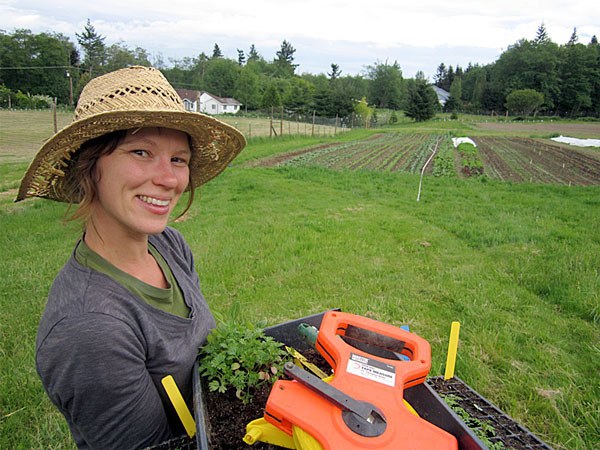As spring brings warmer weather to Whidbey Island, it brings with it a wide array of new tastes for our dinner plates that come straight from South Whidbey’s many farms.
Some of the seasonal produce is more popular than others, ranging from rhubarb to bokchoy to the often maligned kale, but it’s all delicious to Annie Jesperson, the cheerful and young co-owner of Freeland’s Deep Harvest Farm. And she’s going to demonstrate how to cook it fresh from the garden at a presentation this month.
On April 19, Jesperson will lead a cooking demonstration during the Spring Greens workshop, a night of cooking where Whidbey Island farmers gather with advocates of the slow food movement to enjoy the fruits of South Whidbey’s farmland. Following Jesperson’s cooking workshop, there will be one of Slow Food Whidbey Island’s potluck dinners which are becoming famous on the island, said Kathy Floyd, membership chairwoman of Slow Food Whidbey Island, in an email.
According to Jesperson, an event like this is an opportunity to become inspired to get to know each others’ neighbors. “I’m a huge advocate of being an engaged community member and having a relationship with your local food producers and neighbors,” Jesperson said. “Slow food is about getting to know the place and people who create your local cuisine. I think it’s a cause well worth supporting.”
The dishes Jesperson plans to cook up are made almost entirely of spring produce. According to Jesperson, the event represents a pep-talk mission to get people excited about eating whatever vegetables are available in the early spring. The recipes, many of which come from farm share members, include a sautéed mixed greens dish that has an asian-inspired flavor, pesto made from mixed green such as pea shoots and arugula rather than basil and a massaged kale caesar salad. Massaging kale breaks up the leaves and makes it more tender, ridding the kale of the sturdiness that some find off-putting, according to Jesperson.
“I want to encourage people to be bold with the foods they try and to not be afraid of experimentation,” Jesperson said. “If they eat fresh and local, I guarantee their food will be more delicious.”
The Spring Greens workshop will also feature a talk from Anza Muenchow, coordinator of Washington State University Extension’s Island County Master Gardener Program. Muenchow will discuss updates on South Whidbey Tilth and the future of the Farm Tour, which happens in September. She is also the co-owner of Clinton’s Maha Farm and Forest.
“The seasonal aspect of the Spring Greens workshop is important, because it’s challenging to eat in season,” Muenchow said. “These are going to be some cute and wonderful recipes that come entirely from local agriculture.”
To Muenchow, the workshop is as much about education as enjoying the company of the Whidbey community. Slow Food Whidbey Island is hosting the event, and Muenchow said their events always promise a good time and an educational experience on Whidbey food systems and the benefits of localizing one’s pantry. The idea of localizing food is central to the Slow Food movement, an international campaign that started as a reaction to the rise of fast food, according to Muenchow.
“The Slow Food movement is not about being politically correct,” Muenchow said. “It’s about community building and healthy living, since the corporate food system is a problem. Our people have gotten less and less healthy and the carbon footprint from shipping and current growing practices is horrendous.”
For Jesperson, it’s important as a farmer that people understand the food that can be grown nearby and to support their food system.
“The more local we become as consumers, the more environmentally friendly we will all live,” Jesperson said. “It’s something that inspires connection and helps build a sense of place and community.”
The hyper-local spring vegetable dishes will be ready to eat from 5:30-8:30 p.m. Tuesday, April 19 at the Deer Lagoon Grange on Bayview Road.
Tickets cost $10, and can be purchased at the door.



